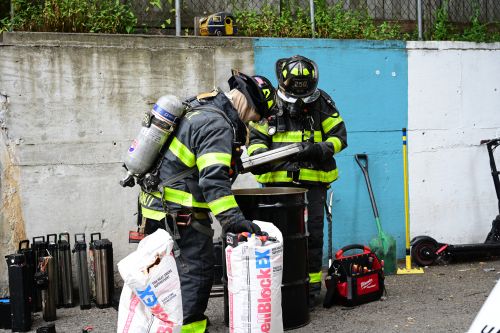A version of this article ran in the September issue of Bicycle Retailer & Industry News. If you are not receiving our magazine, please visit our subscription page.
NEW YORK (BRAIN) — Statistics sometimes can mislead but not when evaluating the effect that the Lithium-ion Task Force has had on reducing battery fire fatalities and injuries in the city through its retail shop inspections, according to FDNY Bureau of Fire Investigation Chief Marshal Daniel Flynn.
While the total number of fires caused by lithium-ion batteries in micromobility devices is roughly unchanged — 141 this year compared with 148 at the same time last year — the number of resulting deaths decreased 92% (from 13 to 1) and injuries 40% (from 92 to 55).
“And you know, I'm generally a skeptical person when it comes to making assumptions about statistics,” said Flynn, a task force member, after quoting the statistics to BRAIN in early August. “But there's no way around the fact that going from 13 to one that some of our efforts here in the city have definitely made a difference.”
To address the city’s escalating battery fires from micromobility devices, Mayor Eric Adams signed off on the City Council’s lithium-ion safety legislative package in March 2023 that became law last fall. It included forming a joint fire marshal task force focused on identifying fire code violations at retail shops through inspections and using data to identify potential violators.
By the numbers
As of August, the task force — also consisting of members from the city’s Bureau of Fire Prevention, fire marshals, and the Department of Consumer and Worker Protection — has:
- Conducted 359 total inspections.
- Issued 299 FDNY summonses, resulting in 436 violation categories.
- Given out 68 violation orders.
- Handed down 16 criminal sentences.
Flynn noted a shift in structural and non-structural fires, with 35 fewer than at the same time last year.
“Our messaging has been, when possible, to keep these outside, whether it's charging or not charging,” he said. “Obviously, a structural fire is a great chance of loss of life. Those numbers are definitely trending in the right direction. I think people are receiving our message, and whenever possible, they are storing these outside and charging them outside. I think that's a great step in the right direction.”
Flynn said the number of daily inspections varies, and when violations are found, more time is needed at any given shop. “We do have repeat offenders, and we need to take more action there,” he said.
None more so than the “Frankenstein battery” shop inspection that led to the closure of an e-scooter business in Queens in February. The task force said during a news conference that Wilson’s E-Scooter Shop,which had failed two previous inspections, was rebuilding lithium-ion battery packs, violating the city fire code. The FDNY recovered about 60 packs and hundreds of lithium-ion cells, some of which began to fail while being removed. They were loaded in haz-mat drums for disposal.
“That was actually a complaint inspection,” said Joseph Rogers, Bureau of Fire Prevention chief inspector and task force member. “When we discovered the amount of batteries that this gentleman had in his location, and just the vast business that he was conducting, it was quite a surprise to everybody.”
Rogers said had any of the tampered batteries gone into thermal runaway while in the shop, the results would have been catastrophic. “He was sandwiched in between two other commercial establishments,” Rogers said.
Battery storage, charging a concern
A standard inspection, in which many are unannounced, includes an overall check of the building, including the fire alarm, sprinkler system, and what’s inside the shop, especially battery storage and charging methods, Rogers said. He said the most common violation is incompatible storage.
“Meaning that the lithium-ion batteries are either stored haphazardly within the working area or overcharging,” Rogers said. “So the New York City Fire Code only allows five batteries to be charged at any given time, a lot of these locations exceed that charging. Also the charging area must be separate from the establishment and the work area, and that requirement is not met a lot of the time.”
The Department of Consumer Worker Protection also looks for compliance of Local Law 39, requiring all batteries be certified by an independent national testing lab, which was mandated in the lithium-ion safety legislative package. Another element in the DCWP’s purview is scanning online retailers in the city to make sure they are selling certified products.
Through early August, the DCWP online enforcement team has issued 40 cease-and-desist letters to online businesses and issued 25 summonses for continued noncompliance.
Online retailers selling uncertified e-bikes and lithium-ion batteries were put on notice at the beginning of August following the Consumer Product Safety Commission ruling that Amazon is a distributor and has responsibility for products sold by third-party sellers that are defective or fail to meet federal safety standards.
“We have met several times with the CPSC,” Flynn said. “We testified at a hearing there (in July 2023), myself and the fire commissioner. So we are definitely in those conversations. We did meet with Amazon recently. Our position is, anything that makes us safer here in the city, we will advocate for that.”
Flynn said the bipartisan Setting Consumer Standards for Lithium-Ion Batteries Act, which the House passed in May, would go a long way toward that. It would establish a federal safety standard for lithium-ion batteries and give the CPSC the authority to create that standard.
“I think we got a great shot of passing that in the Senate and getting signed by the president so that we have some type of certification and some type of quality assurance from these products that are being brought into our country,” Flynn said. “Then Amazon will have to comply with the standard on a national level here in the city. If we can get that done, I think it makes us all safer.”


